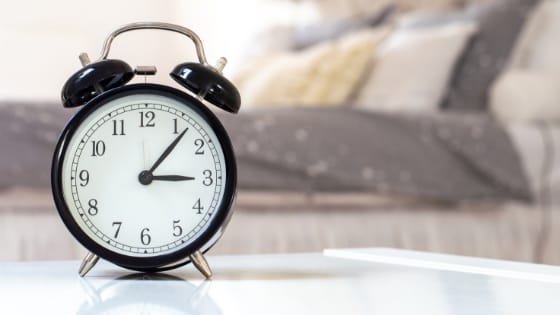The Importance of Getting Proper Sleep

More than one third of Americans are not getting an adequate amount of sleep on a regular basis. It is generally recommended that adults aged 18-60 years sleep at least 7 hours every night to promote optimal health. Sleeping less is associated with an increased risk of developing chronic conditions such as obesity, diabetes, high blood pressure, heart disease, stroke, and frequent mental distress.
You May Be Sleep Deprived If You:
- Need an alarm clock in order to wake up on time
- Rely on the snooze button
- Have a hard time getting out of bed in the morning
- Feel sluggish in the afternoon
- Get sleepy in meetings, lectures, or warm rooms
- Get drowsy after heavy meals or when driving
- Need to nap to get through the day
- Fall asleep while watching TV or relaxing in the evening
- Feel the need to sleep in on weekends
- Fall asleep within five minutes of going to bed
How Sleep Deprivation Can Add to Your Waistline:
Ever noticed how when you’re short on sleep you crave sugary foods that give you a quick energy boost?
There’s a good reason for that. There are two hormones in your body that regulate normal feelings of hunger and fullness. Ghrelin stimulates appetite, while leptin sends signals to the brain when you are full. However, when don’t get the sleep you need, your ghrelin levels go up, stimulating your appetite so you want more food than normal, and your leptin levels go down, meaning you don’t feel satisfied and want to keep eating. So, the more sleep you lose, the more food your body will crave.
Sleep deprivation is linked to: Fatigue, lethargy, and lack of motivation, moodiness and irritability, reduced creativity and problem-solving skills, reduced immunity; frequent colds and infections, concentration and memory problems, impaired motor skills and increased risk of accidents, difficulty making decisions and increased risk of diabetes and heart disease.
To understand the sleep cycles and stages of sleep. Visit: http://www.helpguide.org/life/sleeping.htm 
Here Are Some Tips You Can Try To Increase Your Sleep:
You’ll never be able to catch up on the sleep you are missing now, make sure you are taking the appropriate steps now to increase your sleep on a regular basis.
Create a Perfect Sleeping Environment
- Make your room dark: purchase and install black out blinds or curtains to minimize the external stimulus of light
- Dim your clock radio: turn it away from you, or remove it completely and use your phone or something else for an alarm (sleep with your phone at least 2 feet away from you though)
- Make your room quiet: consider using earplugs to mute disruptive noises such as outside chatter, sirens, or other vehicles, or even a partner snoring
- A fan, humidifier, or air filter can create white noise and be soothing
Develop a Bedtime Ritual
- Workout earlier in the day: Make sure your workout is at least 3 hours before your bedtime if possible.
- Make a to-do list: Of tasks for the next day so you can relax.
- Turn off electronics: At least a half hour before falling asleep.
- Drink some tea: Bedtime, sleepy time, chamomile, kava kava, or an herbal non-caffeinated tea of choice.
- Read a book or magazine: Choose something that won’t cause any anxiety like a non-fiction book or workout magazine.
- Go to the bathroom: Directly before going to bed to empty bladder fully.
- Stick to the same bedtime and wake up time: Even on weekends. This helps to regulate your body’s clock and could help you fall asleep and stay asleep for the night.
- Avoid alcohol, cigarettes, and heavy meals in the evening: They can disrupt sleep. Eating big or spicy meals can cause discomfort from indigestion that can make it hard to sleep. It is good to finish eating dinner at least 2-3 hours before bedtime.
- Eat a bedtime snack: If you have gone longer than 3 and a half hours of eating your dinner, have a small bedtime snack that consists of a protein, fat, and carb.
Need More Help?
Schedule a free consultation with Dr Moyer to discuss how Moyer Total Wellness can help get you sleeping better.
Written by: Jessica (Originally published August 4, 2014, Updated June 4, 2019 by Nicole Morrison)
Photo Credit: Image by Free-Photos from Pixabay





